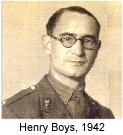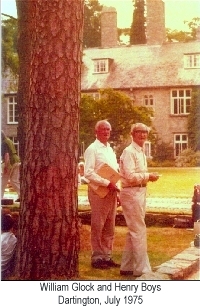|
||||
|
Note: further information will be posted here. Henry Boys was born in London in 1910, and died at his home near Corsham in 1992. He studied at the Royal College of Music for a year before reading English at Queen's College, Cambridge 1929-32. He then returned to the Royal College of Music and completed his studies there in 1934. A hand-written testimonial provided by R. O. Morris, his distinguished teacher of harmony, counterpoint, and composition during both periods, is dated 10 May 1936, and concludes as follows:
Boys had begun attending the
festivals of the International Society of Contemporary Music during his first
year at the RCM, and it was there that he met Aaron Copland, of whose music he
Boys's publications during the 1930s include major articles on Mahler, Stravinsky, Hindemith, and Casella, as well as his first Britten portrait and several outspoken reviews of ISCM festivals. After war service (Royal Artillery), he resumed his career as writer and teacher. His extensive musico-dramatic analysis of Britten's The Rape of Lucretia - a work he had stoutly defended elsewhere against its many critics - concluded an anthology of essays devoted to the opera and published in 1948. In January 1951, Boys joined the Corsham College of Art as Head of its Music Department. He continued his highly influential work as teacher in Corsham until his retirement in 1975. |
||||
|
Material Copyright © 2002 David Drew. |
||||

 was to become the
earliest English advocate. (Their correspondence from the early 1930s is of
genuine historical importance.) One of Boys's fellow students at the RCM -
where they both studied piano with Arthur Benjamin - was the prodigiously
gifted Benjamin Britten. Their long musical friendship and working relationship
has left many important traces.
was to become the
earliest English advocate. (Their correspondence from the early 1930s is of
genuine historical importance.) One of Boys's fellow students at the RCM -
where they both studied piano with Arthur Benjamin - was the prodigiously
gifted Benjamin Britten. Their long musical friendship and working relationship
has left many important traces.